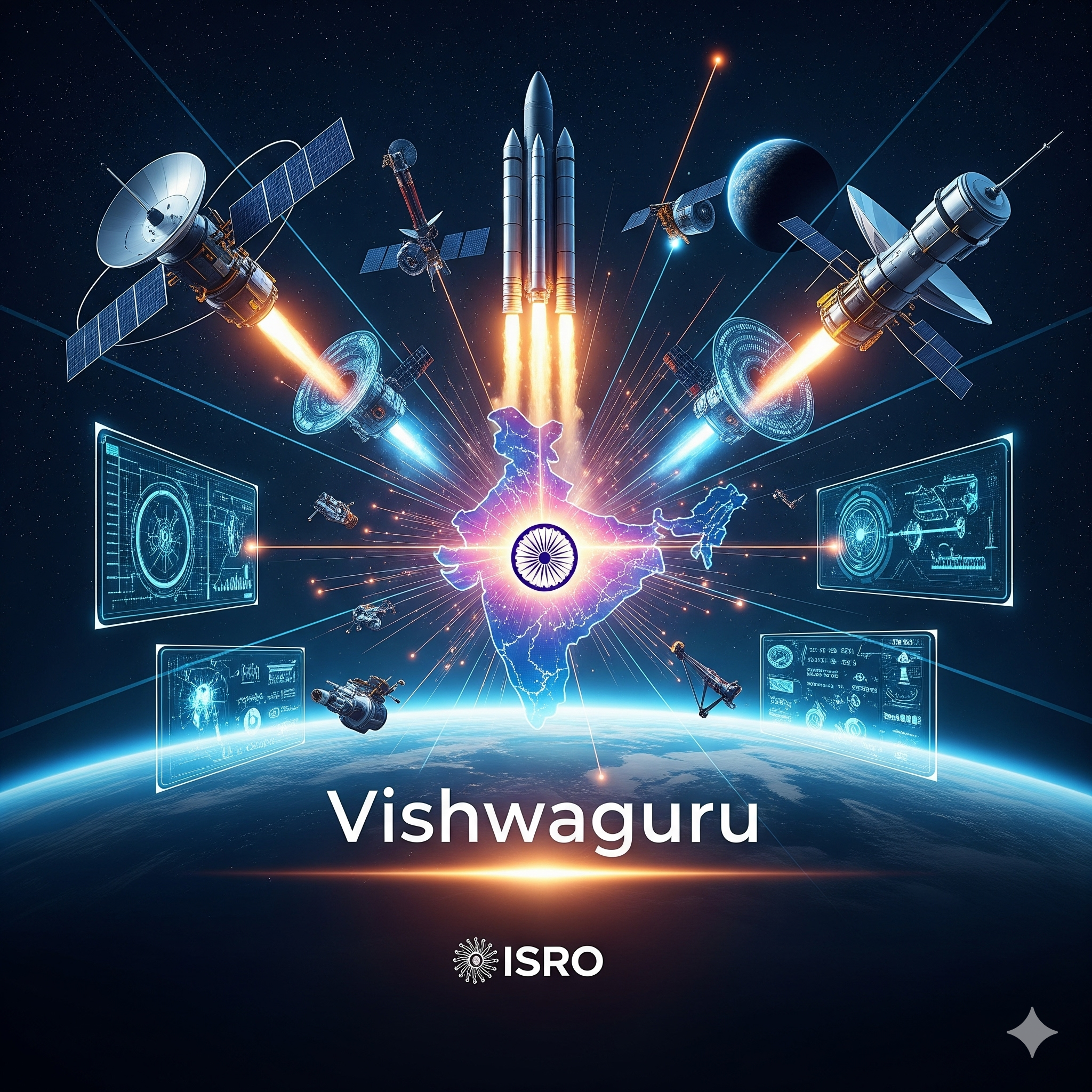Introduction
India has long been revered as a land of wisdom, spirituality, and cultural richness. The idea of Vishwaguru (world teacher) is not a recent notion but a centuries-old recognition of India’s contributions to philosophy, spirituality, ethics, and human values. From the teachings of the Vedas and Upanishads to the principles of non-violence and compassion propagated by Mahatma Gandhi, India has played a central role in shaping global thought.
In the modern world, where material progress often overshadows ethical and spiritual concerns, India’s role as Vishwaguru is gaining renewed relevance. Its spiritual heritage, philosophical traditions, and cultural practices are increasingly influencing how the world perceives issues like peace, sustainability, mental health, and human coexistence.
This essay explores the meaning of Vishwaguru India, its historical foundations, philosophical contributions, and the ways in which India’s spiritual heritage is shaping global thinking in contemporary times.
Historical Roots of Vishwaguru India
1. Ancient Civilizations and Knowledge Systems
India’s history as a Vishwaguru dates back to the Indus Valley Civilization and the Vedic age. The Rigveda, among the world’s oldest known scriptures, emphasizes harmony with nature, cosmic order (ṛta), and ethical living. Ancient universities such as Nalanda and Takshashila were global centers of learning that attracted scholars from across Asia, offering studies in philosophy, astronomy, mathematics, medicine, and literature.
2. Vedic and Upanishadic Wisdom
The Upanishads, philosophical texts that form the core of Indian spiritual thought, introduced ideas like Atman (soul), Brahman (universal consciousness), and Moksha (liberation). These concepts offered humanity a spiritual framework that went beyond rituals to explore the deeper meaning of existence.
3. Buddhist and Jain Contributions
The teachings of Lord Buddha and Lord Mahavira further enriched India’s role as Vishwaguru. Buddhism, with its focus on compassion, mindfulness, and the Middle Path, spread from India to East and Southeast Asia, transforming entire civilizations. Similarly, Jain philosophy emphasized non-violence (ahimsa), vegetarianism, and respect for all living beings, influencing global ethical discourse.
4. India’s Knowledge in Science and Mathematics
Alongside spirituality, India made profound contributions to mathematics (the concept of zero, decimal system), astronomy (Aryabhata’s heliocentric ideas), and medicine (Ayurveda and Sushruta’s surgical techniques). This combination of scientific inquiry and spiritual depth strengthened India’s image as a holistic guide for humanity.
Philosophical Foundations of India as Vishwaguru
1. Dharma and Universal Ethics
The concept of Dharma emphasizes moral duty and righteous living, transcending individual and societal boundaries. Dharma is not limited to religion but represents universal ethics applicable to all humanity. This framework has deeply influenced global ideas of justice, fairness, and sustainable living.
2. Vasudhaiva Kutumbakam – The World as One Family
This ancient Sanskrit phrase, meaning “the world is one family,” embodies India’s inclusive worldview. It stresses global unity, mutual respect, and cooperation, values increasingly vital in today’s interconnected world facing challenges like climate change, pandemics, and conflicts.
3. Yoga and Meditation
Yoga, rooted in Patanjali’s Yoga Sutras, is one of India’s greatest spiritual contributions to the world. Today, yoga and meditation are practiced globally as tools for mental health, stress management, and spiritual well-being. The United Nations’ recognition of International Day of Yoga (21 June) highlights India’s growing soft power.
4. Ahimsa and Satyagraha
Mahatma Gandhi revived India’s ancient principle of Ahimsa (non-violence) and combined it with Satyagraha (truth-force), inspiring movements for civil rights, decolonization, and justice worldwide. Leaders like Martin Luther King Jr. and Nelson Mandela acknowledged Gandhi’s influence on their struggles for equality.
India’s Spiritual Heritage in the Modern World
1. Influence on Global Spirituality
Indian spiritual leaders like Swami Vivekananda, Paramahansa Yogananda, and Sri Aurobindo introduced Vedanta and yoga to the West, transforming Western thought. Their teachings emphasized the unity of all religions, harmony between science and spirituality, and the pursuit of inner peace.
- Swami Vivekananda at the Parliament of Religions in Chicago (1893) declared the message of tolerance and universal acceptance, shaping interfaith dialogue.
- Yogananda’s book “Autobiography of a Yogi” continues to inspire spiritual seekers globally.
2. Holistic Health and Ayurveda
Ayurveda, India’s ancient system of medicine, is increasingly being adopted worldwide as people search for holistic approaches to health. Concepts like balance of mind-body-spirit, seasonal diets, and natural healing align with modern concerns about lifestyle diseases and environmental sustainability.
3. Mindfulness and Mental Health
Mindfulness practices, derived from Indian Buddhist traditions, have been integrated into global psychology and therapy. Modern corporations, schools, and hospitals worldwide use meditation and breathing practices to enhance focus, reduce anxiety, and promote well-being.
4. Cultural Diplomacy and Soft Power
India’s spiritual and cultural heritage plays a central role in its diplomacy. From promoting yoga and Ayurveda internationally to encouraging cultural exchanges, India uses soft power to strengthen its global leadership. For example:
- International Yoga Day events are held in over 190 countries.
- Indian diaspora communities serve as cultural ambassadors of Indian traditions and values.
Impact on Global Thinking
1. Interfaith Dialogue and Religious Harmony
In a world often divided by religious conflict, India’s message of pluralism and respect for all faiths has influenced global interfaith dialogue. The Indian model shows how diverse religious communities can coexist peacefully under a framework of mutual tolerance.
2. Environmental Ethics
Indian spirituality emphasizes living in harmony with nature. Concepts like Prakriti (nature as divine) and reverence for rivers, trees, and animals align with modern environmental movements. Gandhi’s idea of “simple living, high thinking” resonates with sustainable development models worldwide.
3. Peace and Conflict Resolution
India’s philosophy of non-violence has influenced global peace movements. Gandhian approaches to conflict resolution emphasize dialogue, empathy, and justice rather than military aggression, offering alternatives for international diplomacy.
4. Global Governance and Ethics
India’s spiritual heritage is shaping global governance by introducing ethical values into politics and economics. Ideas like inclusivity, transparency, and moral responsibility—rooted in dharma—are increasingly relevant in debates about corporate ethics, governance, and sustainable development.
Challenges to India’s Role as Vishwaguru
While India’s spiritual and cultural heritage is widely respected, challenges remain in consolidating its role as Vishwaguru in the modern world:
- Globalization and Cultural Homogenization – Western consumer culture often overshadows indigenous traditions, creating pressure on India’s heritage.
- Internal Contradictions – Social inequalities, communal tensions, and political polarization sometimes undermine India’s spiritual message of unity.
- Commercialization of Spirituality – The global popularity of yoga and meditation has led to commercialization, sometimes detaching these practices from their deeper spiritual roots.
- Geopolitical Constraints – Competing global powers and international politics limit India’s influence despite its cultural leadership.
Future of Vishwaguru India
1. Reviving Ancient Knowledge in Modern Context
India can strengthen its role as Vishwaguru by integrating its spiritual wisdom with modern science and technology. For example, research into Ayurveda and yoga using scientific methods can increase their global acceptance.
2. Promoting Global Peace and Sustainability
India’s philosophy of Vasudhaiva Kutumbakam can guide international cooperation on climate change, sustainable development, and global peace initiatives. By presenting an alternative to materialistic models of growth, India can offer ethical frameworks for the 21st century.
3. Digital Platforms for Spiritual Diplomacy
India can leverage digital platforms to spread its spiritual teachings globally. Online yoga classes, meditation apps, and digital archives of ancient texts can reach new generations worldwide.
4. Youth and Global Leadership
Indian youth, empowered by technology and rooted in cultural values, can serve as global ambassadors of India’s spiritual heritage. By balancing innovation with tradition, they can carry forward India’s Vishwaguru legacy.
Conclusion
The vision of Vishwaguru India is not merely about reviving the past but about offering timeless values that address contemporary global challenges. From the message of universal brotherhood in the Vedas to the modern appeal of yoga and mindfulness, India’s spiritual heritage continues to shape global thinking.
In a world facing crises of violence, ecological destruction, and mental health struggles, India’s teachings of harmony, compassion, and self-realization provide pathways for sustainable living and peaceful coexistence.
Thus, India’s role as Vishwaguru is not just a matter of pride but a responsibility—to guide humanity toward balance between material progress and spiritual wisdom. Its contributions in philosophy, spirituality, and cultural diplomacy ensure that India remains a beacon of light in the modern world.




